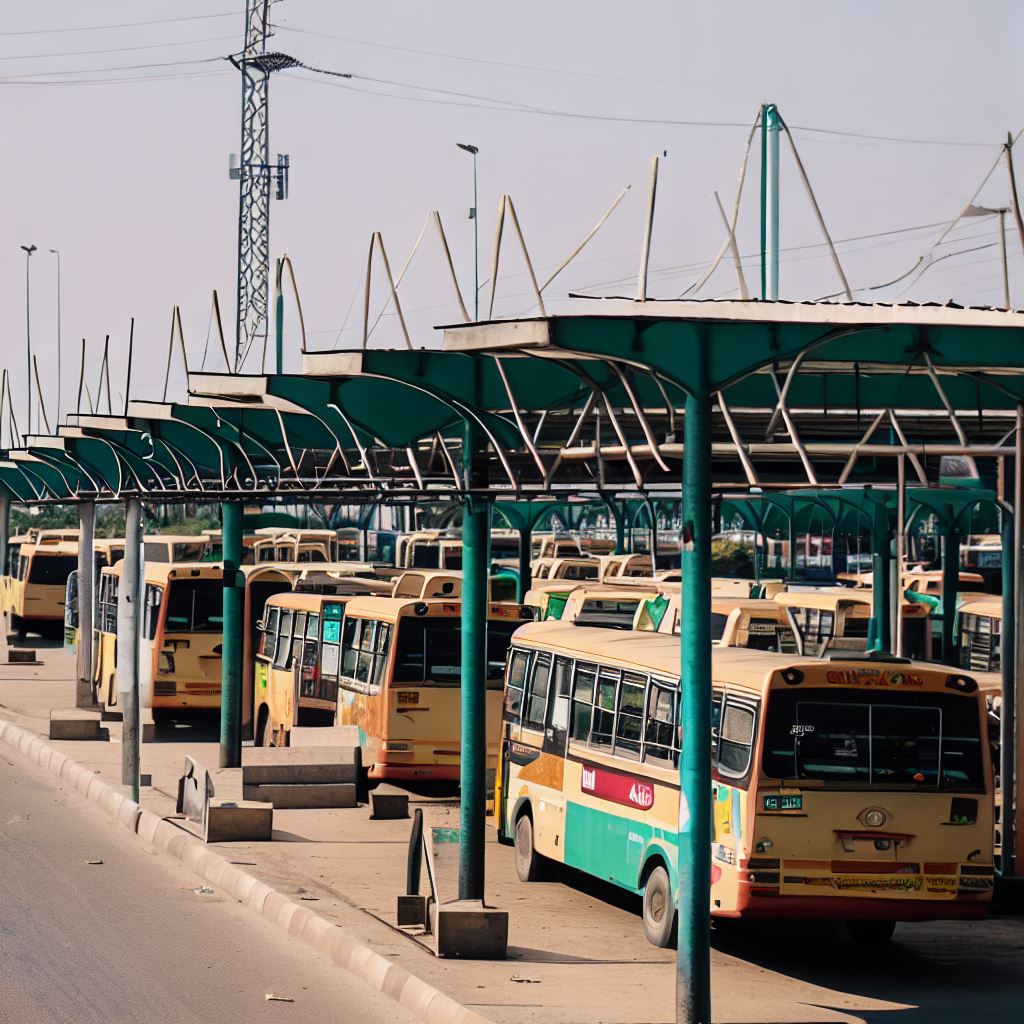Introduction
Bus drivers play a crucial role in Nigeria’s transportation system, connecting people to various destinations.
In this blog post, we will explore the challenges and rewards that come with being a bus driver in Nigeria.
Being a bus driver in Nigeria comes with unique challenges and rewards that are specific to this profession.
Bus drivers form an integral part of Nigeria’s transportation system, catering to the needs of commuters.
They are responsible for ensuring the safe and timely transport of passengers to their desired locations.
However, being a bus driver in Nigeria is not without its challenges.
Firstly, navigating through the chaotic traffic in major cities can be a daunting task, requiring exceptional driving skills and patience.
Secondly, dealing with unruly passengers who violate transport rules and regulations can be a major challenge for bus drivers.
Moreover, the daily exposure to environmental pollution and adverse weather conditions poses health risks to bus drivers.
Despite these challenges, there are also rewarding aspects of being a bus driver in Nigeria.
One significant reward is the social interaction and sense of community that comes with meeting different people from diverse backgrounds.
Furthermore, the ability to contribute and make a positive impact on Nigeria’s transportation system can bring a sense of fulfillment to bus drivers.
In addition, the job security and steady income that comes with being a bus driver can provide stability for their families.
Overall, the profession of bus driving in Nigeria is associated with both challenges and rewards that are unique to this line of work.
In the following blog sections, we will delve deeper into these challenges and rewards, providing a comprehensive understanding of the bus driver profession in Nigeria.
Challenges of Being a Bus Driver in Nigeria
Being a bus driver in Nigeria comes with its fair share of challenges and obstacles.
These challenges not only make the job difficult but also put the drivers’ safety and well-being at risk.
Let’s take a closer look at some of the challenges faced by bus drivers in Nigeria:
A. Traffic congestion and navigating poorly maintained roads
- One of the major challenges faced by bus drivers in Nigeria is the constant traffic congestion and poorly maintained roads.
- These factors not only slow down the journey but also add to the stress levels of the drivers.
B. Dealing with reckless and undisciplined drivers
- Nigerian roads are known for their chaotic traffic conditions, and bus drivers have to constantly deal with reckless and undisciplined drivers.
- This can lead to frequent altercations and conflicts on the road.
C. Exposure to air pollution and health hazards
- Bus drivers spend a significant amount of time on the road, which exposes them to high levels of air pollution.
- This constant exposure can lead to various health hazards, including respiratory problems and increased risk of diseases.
D. Risk of accidents and road safety concerns
- The risk of accidents is a constant concern for bus drivers in Nigeria.
- Poor road infrastructure, reckless driving behavior, and overcrowded buses all contribute to an increased risk of accidents, putting the drivers and passengers in danger.
E. Long working hours and fatigue
- Bus drivers in Nigeria often have to work long hours to meet the demands of their job.
- This can lead to fatigue and exhaustion, which in turn affects their ability to stay alert and focused on the road.
F. Lack of proper infrastructure and facilities for drivers
- Another challenge faced by bus drivers is the lack of proper infrastructure and facilities provided to them.
- This includes rest areas, clean toilets, and maintenance facilities for their vehicles.
- The absence of these facilities further adds to the job’s difficulties.
Despite these challenges, there are also some rewards associated with being a bus driver in Nigeria, which we will explore in the next section.
Basically, the challenges faced by bus drivers in Nigeria are numerous and significant.
From traffic congestion and navigating poorly maintained roads to dealing with reckless drivers and facing health hazards, bus drivers have a tough job.
It is essential for the government and relevant authorities to address these challenges and provide better support and infrastructure for bus drivers in the country.
Read: Social Media Tips for Promoting Beauty Therapy in Nigeria
Rewards of Being a Bus Driver in Nigeria
Being a bus driver in Nigeria comes with its fair share of challenges, but it also offers a range of rewards that make the profession fulfilling and worthwhile.
In this section, we will explore some of these rewards.
A. Financial Stability and Job Security
- Steady Income: Bus driving offers a dependable source of income, providing financial stability.
- Growing Demand: Nigeria’s growing population ensures a constant need for public transportation.
- Job Security: As long as people need to commute, bus drivers will have job security.
B. Opportunity for Entrepreneurship and Income Generation
- Ownership: Some drivers become bus owners, creating a business opportunity.
- Additional Income: Operating multiple routes or owning a fleet can boost earnings.
- Empowerment: Entrepreneurship can lead to financial independence and growth.
C. Community-Building and Social Interaction
- Connecting Communities: Bus drivers play a vital role in connecting neighborhoods and communities.
- Interaction: Daily interactions with passengers foster a sense of community and belonging.
- Local Recognition: Drivers often become familiar faces and respected members of their communities.
D. Sense of Satisfaction from Providing a Crucial Service to the Public
- Public Service: Bus drivers serve a crucial role in public transportation, helping people reach their destinations.
- Helping Others: The satisfaction of assisting passengers adds purpose to the job.
- Community Impact: Drivers contribute to the development and efficiency of urban transportation.
E. Flexibility and Independence in Work Schedule
- Work-Life Balance: Many drivers enjoy flexible work schedules that allow for family and personal time.
- Independence: While adhering to routes and schedules, drivers have some autonomy during their shifts.
- Part-Time Options: Part-time driving can provide extra income while maintaining flexibility.
F. Development of Driving Skills and Experience
- Skill Enhancement: Bus drivers refine their driving skills through daily practice.
- Safety Consciousness: Safety is paramount, and drivers develop strong safety habits.
- Career Progression: Experience can lead to advancement opportunities within the transportation industry.
While being a bus driver in Nigeria presents its unique set of challenges, the rewards can be substantial.
Financial stability, entrepreneurship opportunities, community-building, job satisfaction, flexibility, and skill development all contribute to making this profession a fulfilling choice for many individuals.
It’s a profession that not only keeps the wheels of transportation turning but also offers personal and financial growth potential.
Read: Becoming a Bus Driver in Nigeria: Steps & Qualifications

Strategies for Overcoming Challenges
Being a bus driver in Nigeria can be a challenging job, but there are several strategies that can help overcome these challenges and ensure a rewarding career.
Here are some key strategies:
A. Implementation of proper training programs for bus drivers
- Providing comprehensive training programs for bus drivers is crucial to equip them with the necessary skills to handle the challenges they may encounter on the road.
- These programs should focus on defensive driving, customer service, and emergency response.
B. Improvement of road conditions and infrastructure
- Investing in the improvement of road conditions and infrastructure is essential to enhance safety and efficiency on Nigerian roads.
- This includes regular maintenance, expansion of road networks, and the construction of modern bus terminals and stops.
C. Enforcing traffic regulations and penalties for reckless driving
- Strict enforcement of traffic regulations and penalties for reckless driving is necessary to deter drivers from engaging in dangerous behaviors.
- This includes speed limits, proper lane usage, and adherence to traffic signals.
D. Regular vehicle maintenance and safety checks
- Maintaining a rigorous schedule for vehicle maintenance and safety checks is crucial to ensure the proper functioning of buses.
- This includes regular inspections for brakes, tires, lights, and other essential components.
E. Provision of health insurance and medical facilities for drivers
- Providing access to health insurance and medical facilities is important to safeguard the well-being of bus drivers.
- Regular check-ups, vaccination programs, and prompt medical attention in case of accidents or illnesses should be ensured.
F. Collaboration between government agencies and transport unions for driver welfare
- A strong collaboration between government agencies and transport unions is necessary to address driver welfare issues effectively.
- This includes advocating for fair wages, decent working conditions, and better benefits for bus drivers.
By implementing these strategies, the challenges faced by bus drivers in Nigeria can be mitigated, and their overall experience can be significantly improved.
Read: Intercity Transit in Nigeria: A Bus Driver’s Perspective
Personal Experiences and Testimonials
Bus drivers in Nigeria face numerous challenges on a daily basis.
They endure long hours, heavy traffic, and difficult passengers, yet they continue to provide an essential service that keeps the country moving.
In this section, we will delve into the personal stories and experiences of bus drivers in Nigeria, highlighting their struggles and motivations.
A. The Struggles They Face
Being a bus driver in Nigeria is not an easy task. One of the biggest struggles these drivers face is the never-ending traffic.
The chaotic roads and congested streets often lead to frustration and stress. Imagine sitting behind the wheel for hours, inching forward in a sea of cars, only to be met with impatient honking and unruly passengers.
Furthermore, the lack of proper infrastructure adds another layer of difficulty. Many roads are in poor condition, filled with potholes and uneven surfaces.
Maneuvering through these obstacles requires immense skill and concentration. Bus drivers constantly face the risk of damaging their vehicles or getting stuck on the road.
Dealing with difficult passengers is another challenge. Some passengers are rude, impatient, and even confrontational.
Bus drivers are expected to maintain their composure and provide a safe and comfortable journey despite these challenges.
It takes immense strength and resilience to handle such situations on a regular basis.
B. Their Motivation to Carry On
Despite the challenges, there are several factors that motivate bus drivers in Nigeria to keep going.
One significant motivation is the financial aspect. For many drivers, this job serves as their primary source of income.
The money earned from their long hours of work helps them provide for their families and cover their basic needs.
Another motivating factor is the sense of pride and responsibility they feel. Bus drivers understand the importance of their role in society.
They contribute to the daily lives of countless Nigerians by ensuring they reach their destinations safely and on time. This responsibility instills a sense of purpose in their work.
Lastly, the gratitude and feedback from passengers play a vital role in keeping bus drivers motivated.
Passengers often express their appreciation for the service provided. They acknowledge the skill and dedication of these drivers, recognizing the impact they have on their daily lives.
Such positive feedback acts as a reminder that their hard work is valued and makes a difference.
C. Impact on Passengers’ Lives
The stories and testimonials from passengers showcase the deep impact bus drivers have on their daily lives.
Many passengers rely on these drivers to commute to work, visit family and friends, and engage in various activities.
Without the services of bus drivers, essential tasks would become significantly more challenging for the people of Nigeria.
One testimonial from a regular passenger, Bola, highlights the importance of bus drivers. She shares, “Every morning, I board a bus driven by Mr. Ade.
His friendly demeanor and safe driving make my daily commute enjoyable. I am grateful for his dedication and reliability.”
These stories demonstrate the strong bond between passengers and their drivers.
Bus drivers not only provide transportation but also contribute to the overall experience of the journey. Passengers rely on them for a safe, comfortable, and efficient commute.
In short, the personal stories and experiences of bus drivers in Nigeria shed light on the challenges they face and the motivations that keep them going.
Despite the struggles posed by heavy traffic, difficult passengers, and inadequate infrastructure, bus drivers continue to provide an essential service to the Nigerian population.
They take pride in their work and understand the impact they have on passengers’ daily lives.
The appreciation and positive feedback from passengers serve as a reminder of their importance and encourage them to persevere.
Read: Top Routes for Intercity Bus Travel in Nigeria Explained
See Related Content: Health and Safety for Waiters: Nigeria’s Standards
See Related Content: Online Customer Service Tools: Adoption in Nigeria’s Market
Conclusion
Throughout this blog post, we discussed the challenges and rewards faced by bus drivers in Nigeria.
We highlighted the difficult working conditions they encounter daily, from heavy traffic to unruly passengers.
However, we also acknowledged the rewards of their job, such as being able to connect with diverse communities and witnessing the growth and development of their cities.
It is crucial to recognize and appreciate the contributions of bus drivers in Nigeria.
They play a significant role in keeping the transportation system functioning smoothly and ensuring that people can move around conveniently.
Without their dedication and hard work, commuting in Nigeria would be even more challenging.
To support and improve the welfare of bus drivers, it is essential to initiate various initiatives.
These initiatives can include providing training programs to enhance their skills, organizing regular health check-ups, and implementing strict regulations to ensure their safety.
Additionally, better remuneration and working conditions will help motivate and retain these drivers, making their job more fulfilling.
In the end, bus drivers in Nigeria face numerous challenges, yet their contributions should not go unnoticed.
By recognizing their efforts and implementing measures to improve their working conditions, we can show our appreciation for their vital role in the transportation sector.
Let us all support initiatives that aim to enhance the welfare and working conditions of bus drivers in Nigeria, ultimately benefiting the entire community.




